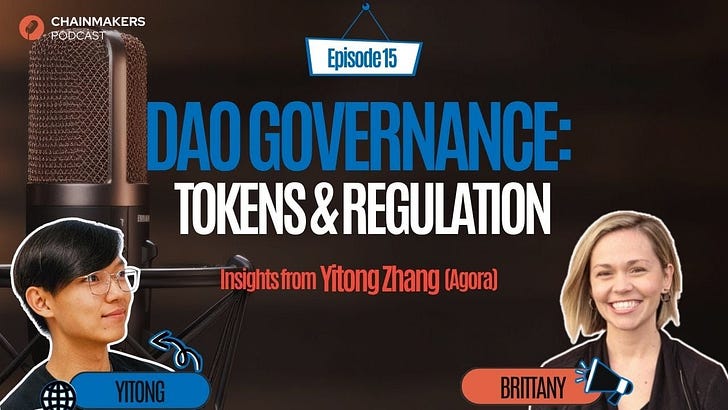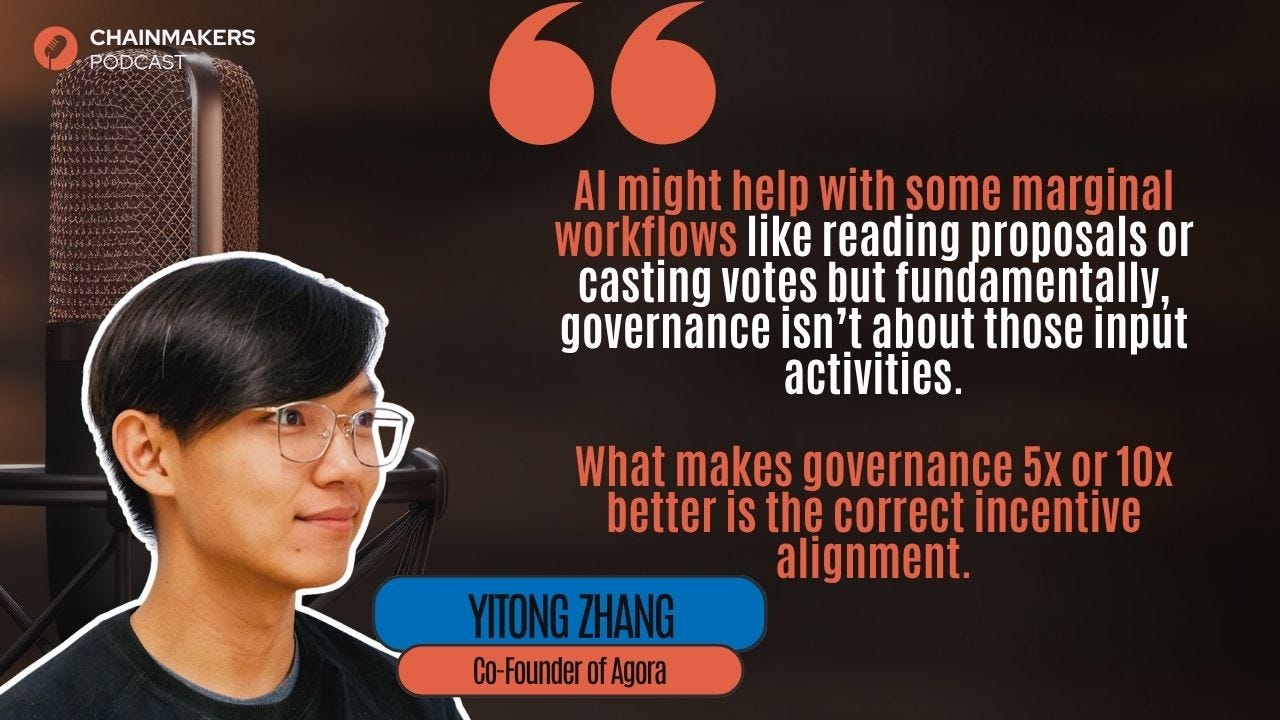This One Decision Could Make or Break Your DAO
Lessons from designing decentralized systems with Yitong Zhang of Agora
The Problem With Governance Today
For a long time, governance in crypto felt like a side quest, something projects bolted on after launch to satisfy the idea of decentralization. But after sitting down with Yitong Zhang, co-founder of Agora, I realized we’ve been asking the wrong questions.
Yitong’s career started in product design at Coinbase, but it was Ethereum’s potential that pulled him deep into Web3. His obsession? Rethinking how groups of people make decisions online, starting with governance tools that actually work.
But here's the catch: most governance systems today weren't built for users. They were built to avoid regulatory scrutiny. Yitong described it as designing for Gary Gensler without a playbook. No clarity. No standards. Just vibes and a lot of legal guesswork.
Sound familiar?
Building For Real Communities, Not Just Compliance
Agora’s goal is bold but clear: help projects launch on-chain organizations that are better than their off-chain counterparts. That means asking real, human questions like:
Who gets access to what and when?
Should every vote be open to the community?
What tools can make these decisions feel empowering, not exhausting?
Agora works with teams like Optimism, ENS, and Uniswap to build systems that support real-time collaboration and decision-making. But they’re also pragmatic. Not everything needs to be decentralized on Day 1 and not everything should be.
Yitong shared how teams are now more strategic about decentralization. Some start by centralizing protocol upgrades while allowing the community to vote on funding. Others flip that. The point is: one-size-fits-all doesn’t work here. Fit-for-purpose governance does.
We’re in the “Regency” Era of Crypto Regulation
One of the most vivid metaphors Yitong used? He said we’re in a “regency” period. The old rules are fading, but the new ones haven’t taken the throne yet. So what happens in between?
Confusion. Legal gray zones. Token launches that cost millions only to dead-end. (I’ve seen it firsthand.)
Right now, some projects are cautiously launching out of US entities. Others are staying offshore. And a few are trying spicy new models like Zora’s US-based airdrop with a zero-cost-basis legal theory.
So what’s a founder supposed to do?
As Yitong put it: most teams are punting decisions until the rules are clearer. But if regulation is in flux, governance becomes even more important. It's not just a checkbox, it’s your safety net.
What’s Next for Governance? Fit-for-Purpose Models
Two standout models from our chat:
✅ Optimism – Taking a “big tent” approach. They gradually decentralize over time, with community veto power and expert committees. Complex, but carefully managed.
✅ Aerodrome – A lean, single-purpose system focused on aligning token holders and LPs. Simple. Targeted. Efficient.
Different approaches. Same goal: clarity, alignment, and durability.
What I loved was how Yitong framed governance as a spectrum, not a binary. And how tools like Agora are helping teams find their place along that spectrum without reinventing the wheel.
Will AI Change Governance? Not Quite
I had to ask Yitong: what about AI?
His take? AI might automate governance adjacent tasks (summarizing proposals, managing notifications), but the core of governance.. alignment, decision-making, trust, is inherently human.
I found that strangely comforting.
So here's a question for you:
Do you think governance can scale without becoming overly bureaucratic? And what would make you want to participate in a DAO or token community?
The Path Forward: Less Peter Pan, More Growing Up
Yitong said something that stuck with me. Crypto has a Peter Pan problem. We don’t want to grow up. But if we want to build things that last 10 years or more, we have to get better at structure, operations, and yes, governance.
And that’s not a bad thing. It just means more people, more trust, more responsibility. We’ve seen Web2 companies make this leap. Now it’s crypto’s turn.
What does your governance look like today? And what do you want it to look like in five years?
Let’s talk about it.
We go even deeper into DAO tooling, regulatory grey zones, and how teams can build systems that actually scale.
👉 You can catch the full episode on YouTube
One of the best parts of hosting Chainmakers is getting to share these behind-the-scenes conversations, especially the honest ones. I hope this gave you something to think about, whether you’re launching your first token or just DAO-curious.
If something sparked a thought, drop me a message or DM me on X: @br_ttany.
I’d love to hear what you’re seeing on the ground too.
Keep Building,
Brittany



